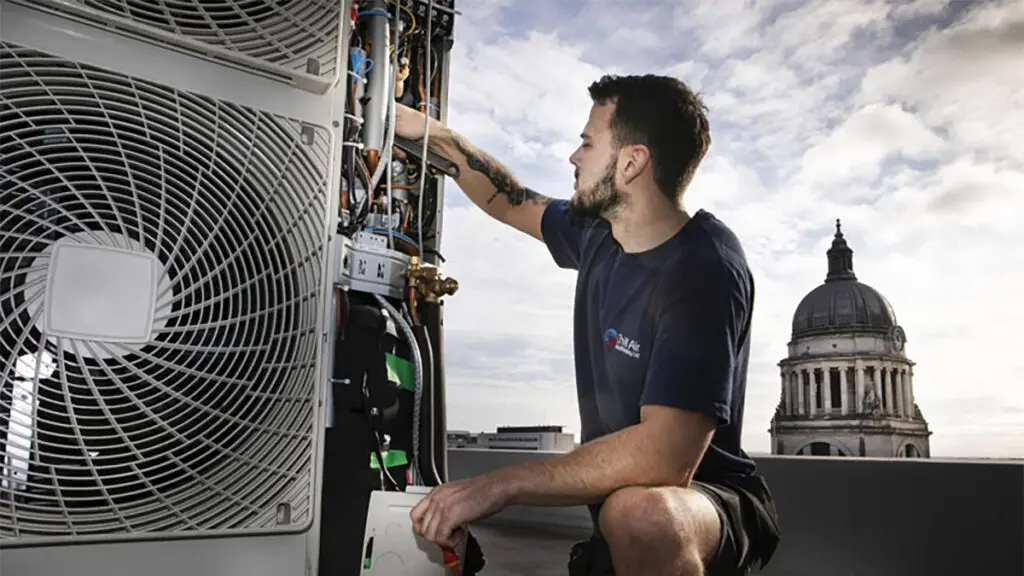Heat pumps are gaining traction as a green alternative to traditional gas heating systems. Businesses are increasingly exploring these technologies to cut costs and reduce carbon emissions.
This article examines how heat pumps work, their benefits, and their role in commercial renewable energy strategies.
How Heat Pumps Work
A heat pump can replace a traditional gas boiler in almost any building. Fitted to an external wall with sufficient space, it collects outdoor air and transports it through a series of antifreeze-filled pipes. The liquid, colder than the ambient air, absorbs heat, which is then turned into steam by a compressor. This steam heats water and radiators within the building.
As the majority of the heat is sourced from natural resources and only a small amount of electricity is needed, heat pumps eliminate the need for fossil fuels. If powered by renewable electricity, they can be completely carbon neutral.
Additionally, heat pumps are three times more efficient than traditional systems, significantly reducing energy costs even in low temperatures. They offer a cheaper, more environmentally friendly heating solution.
Environmental and Economic Advantages
With the growing emphasis on sustainability, businesses are reassessing their practices to adopt greener solutions. Heat pumps contribute significantly by reducing the carbon footprint of commercial spaces and enhancing green credentials.
The rising energy costs have driven the demand for more efficient systems. Heat pumps not only help cut energy expenses but are also more affordable to install due to the absence of VAT until 2027 and available government grants.
Heating buildings accounts for 23% of the UK’s carbon emissions, with commercial buildings contributing 4% and industrial heating 14%. Switching to heat pumps can drastically lower these figures, aiding in the achievement of national carbon reduction goals.
Wide Adoption Among Businesses
Businesses are increasingly adopting heat pumps, recognising their long-term benefits.
Commercial properties often face high heating costs due to the larger spaces they cover. Heat pumps provide a cost-effective and environmentally friendly alternative.
The recovery process within heat pumps allows for the reuse of waste heat, further enhancing efficiency. With government incentives supporting their adoption, now is the optimal time for businesses to invest in heat pump technology.
Incentives and Support
To achieve net zero targets, the government is promoting the use of renewable heating systems, including heat pumps, through grants and tax breaks.
From 2025, the International Energy Agency recommends ending the sale of new fossil fuel boilers, a likely government policy. Thus, businesses must act swiftly to leverage available incentives.
A climate change agreement with the Environment Agency can also provide additional discounts on a climate change levy typically added to electricity and fuel bills.
Efficiency and Sustainability
Heat pumps are highly efficient, converting waste heat into usable energy and reducing the need for fossil fuels.
This efficiency helps in cutting carbon emissions significantly, contributing to national and global sustainability goals.
The use of heat pumps aligns with corporate strategies focused on environmental responsibility. Businesses investing in this technology gain enhanced green credentials and contribute to broader carbon reduction targets.
Future Prospects
The shift towards heat pumps is set to continue as more businesses understand their benefits.
The installation of heat pumps is becoming increasingly viable with current government support and incentives.
With their ability to significantly reduce carbon emissions and energy costs, heat pumps are central to future commercial renewable energy strategies.
Impact on Business Strategies
Adopting heat pumps can drastically influence a business’s environmental strategy.
These systems not only lower costs and carbon emissions but also elevate a company’s commitment to sustainability.
As efficiency and environmental consciousness become more critical, integrating heat pumps into business operations is a strategic move towards a greener future.
Heat pumps play an integral role in modernising commercial heating systems, offering both economic and environmental benefits.
With the push towards sustainability and government incentives, now is the perfect time for businesses to switch to this efficient technology.

